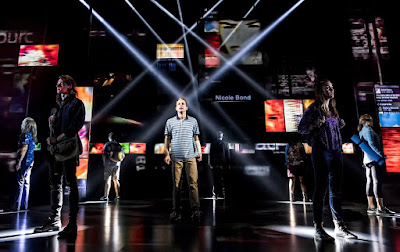Theater: Dear Evan Hansen—a millennial musical with a heart
Dear Evan Hansen
Book by
Steven Levenson
Music and lyrics
by Benj Pasek and Justin Paul
Starring Michael
Lee Brown, Garrett Long, Michael Park, Mike Faist
August 26,
2017
In my review of last year’s hit film La La Land, I commented on how it looked
backwards to the big film musicals of the 1950’s but also conveyed a uniquely millennial
sensibility, in which the lovers sing, dance, part, but don’t get back together, since their individual goals trump an old fashioned
off-into-the-sunset relationship. The current hit Broadway musical Dear Evan Hansen now takes us to some millennials
in their formative, angst-ridden teen years. This topic has a long history of
portrayal in generationally-specific films (from Rebel without a Cause to The
Breakfast Club to Boyhood), and
at least a few musicals, most recently the 2015 Broadway Spring
Awakening, a dark rock musical about tortured adolescence based on a nineteenth century German
play. Dear Evan Hansen plays quite an
emotional distance from this, with a largely upbeat tone. The plot centers on a
socially awkward teen who becomes popular by capitalizing on the suicide of a
classmate, spinning it into social media tributes, YouTube videos, and all the
current trappings of millennial “fame”. In another era, when the scheme
inevitably collapses, this would have been the time for an object lesson in
humility, or newly gained appreciation for higher truths of honesty or loyalty.
Not in 2017! The musical sort of peters out without a big finish (just like La La Land), and the message seems to be
that, well, even if your efforts to be famous fail due to your own flaws, at
least you tried--at least you were yourself and aimed to stand out from the
crowd and be somebody. As the catchy
Act 1 closer “You Will be Found” confidently states:
So let the sun come streaming in
Cause you’ll reach up and you’ll rise
again
Lift your head and look around
You will be found
Romance somehow never seems as important as self-fulfillment in the art of our era, despite the fact that teems obsess about sex just as always. It’s a
little hard for me to respond to all this as a triumph of modern humanity, but the millennial
parents and kids at the performance certainly seemed to (tears, overwhelming
ovation). Such is the state of inspiring messages in our era.
There was
considerable disappointment before the Saturday evening performance, when
understudies were announced for both Tony-award winners Ben Platt (Evan) and Rachel
Bey Jones (his mother Heidi). However, I was very impressed with the
performance of Michael Lee Brown (left, below) as Evan. His looks are angular, less cherubic
than those of the now-famous Platt (right) and his upcoming replacements on Broadway.
There is less star quality, but more teen angst and more authenticity, at least evidenced by the excerpts of Platt I have seen online. Brown played Evan with a great balance of introversion, hope, cluelessness, and haplessness, and all the nuances were clearly portrayed. He managed the tricky vocal solos well. They are written in a high baritone range, with frequent high extensions that use the currently in vogue falsetto range (e.g. a common interval is G, rising to high F# then G, pushing the male voice into falsetto, especially when singing softly). Compared to Platt, Brown has a higher tenor range, so could sing some of these notes full voice, not falsetto. In crescendos and loud passages this added some vocal excitement not present in the online versions I have heard from Platt. Evan is a really demanding role, with the lead onstage for 90% of the show, much like Mama Rose in Gypsy. If Brown is not a prototypic star, he fully held the stage and made me believe the character. He deserves the lead in a touring or later Broadway production, perhaps in a smaller house where a big name is not as financially critical. Other standouts in the cast were Mike Faist as bad boy Connor and Michael Park as Evan’s father, and Laura Dreyfuss as his on-off girlfriend. Each one’s interactions with Evan were dramatically vivid.
There is less star quality, but more teen angst and more authenticity, at least evidenced by the excerpts of Platt I have seen online. Brown played Evan with a great balance of introversion, hope, cluelessness, and haplessness, and all the nuances were clearly portrayed. He managed the tricky vocal solos well. They are written in a high baritone range, with frequent high extensions that use the currently in vogue falsetto range (e.g. a common interval is G, rising to high F# then G, pushing the male voice into falsetto, especially when singing softly). Compared to Platt, Brown has a higher tenor range, so could sing some of these notes full voice, not falsetto. In crescendos and loud passages this added some vocal excitement not present in the online versions I have heard from Platt. Evan is a really demanding role, with the lead onstage for 90% of the show, much like Mama Rose in Gypsy. If Brown is not a prototypic star, he fully held the stage and made me believe the character. He deserves the lead in a touring or later Broadway production, perhaps in a smaller house where a big name is not as financially critical. Other standouts in the cast were Mike Faist as bad boy Connor and Michael Park as Evan’s father, and Laura Dreyfuss as his on-off girlfriend. Each one’s interactions with Evan were dramatically vivid.


Comments
Post a Comment